I'm with you there.I have to say, if I have the chance to listen to an accordionist playing F. Couperin or Ole Schmidt, I'll likely choose the former.
I'm getting a bit minimalised out at the moment having spent a lot of misspent youth with Arvo Part and Mr Glass! I won't be rushing to get to grips with Mr Lohse......
Agree: I think those two are honest music but a long way off genius and some of the better pieces seem to rely on a blazing technique above all else.The first two that pop into my mind are Pietro Frosini and Nikolai Chaikin.
A lot of Frosini is "easy listening" rather than "deep", but you can tell that he really understood how to play his instrument, and he composed carefully to get maximum effect with minimum effort. I don't think anyone before or since has equalled him for that. (You see something similar in orchestral music, where people who really understand a given instrument write for it differently -- more efficiently.
This is interesting too. For my ears Semyonov is a modern day Frosini.As long as your ear can stand a bit more dissonance, Semenov is excellent. Among the young living composers, I have a high opinion of Gorka Hermosa, not just for his composing but his writing on history and musicology too
The one that is newish to me (although probably not to anyone else) is Zolotaryov, and to my ears it's in a completely different league to all of these. The guy was a genius - original, tuneful, witty, economical and had a lot to say. I'd put him at the very very top of all composer's that wrote for the accordion ever. The so called children's suites are amazing music, up there with Mussorgsky or Tchaikovsky.
For economy (and ease of playing) listen to the beautiful second movement 'one inch girl'. This is genius, so few notes but so much said.


